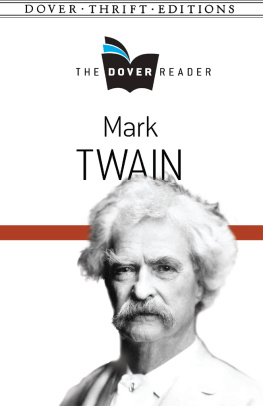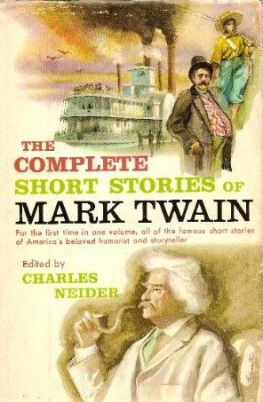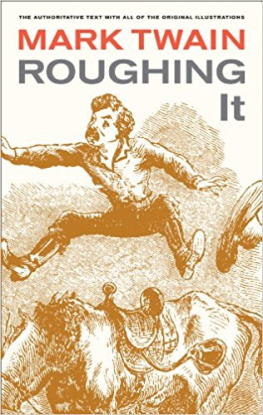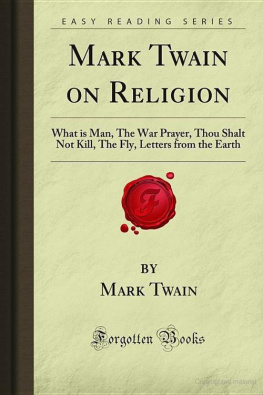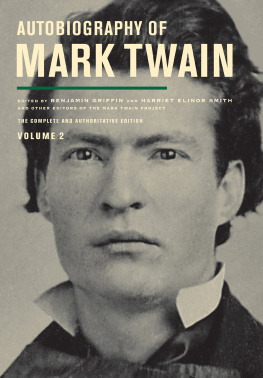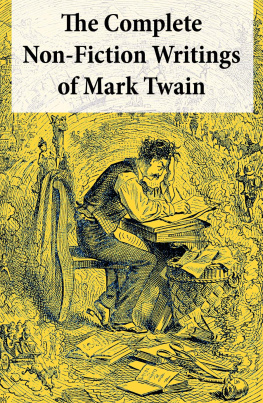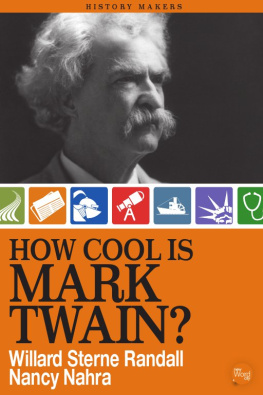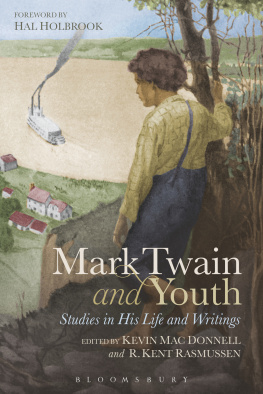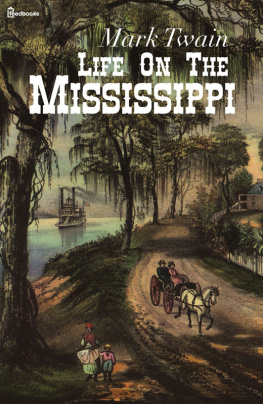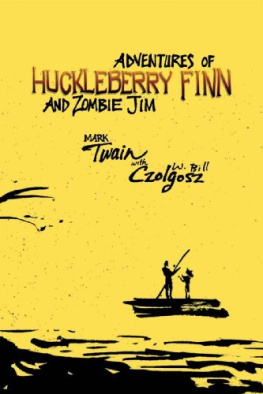
Mark Twain

DOVER PUBLICATIONS, INC.
Mineola, New York
DOVER THRIFT EDITIONS
G ENERAL E DITOR : M ARY C AROLYN W ALDREP
E DITOR OF T HIS V OLUME : J ANET B.K OPITO
Copyright
Copyright 2014 by Dover Publications, Inc.
All rights reserved.
Bibliographical Note
Mark Twain: The Dover Reader, first published by Dover Publications, Inc., in 2014, is a new compilation of novels and short fiction by Mark Twain reprinted from standard editions.
Library of Congress Cataloging-in-Publication Data
Twain, Mark, 18351910.
[Works. Selections]
Mark Twain: the Dover reader / Mark Twain.
p. cm. (Dover thrift editions)
eISBN 13: 978-0-486-80140-7
I. Title.
PS1302 2014
813.4dc23
2014033867
Manufactured in the United States by Courier Corporation
79120301 2014
www.doverpublications.com
Note
This anthology attempts to convey the distinctive humor, keen powers of observation of his fellow humans, and occasional cynicism of the American master Mark Twain. Included are one of his best-known and beloved novels, Adventures of Huckleberry Finn; a generous excerpt from his autobiographical work Life on the Mississippi; and four entertaining and thought-provoking stories, The Notorious Jumping Frog of Calaveras County, The 1,000,000 Bank-Note, The Man That Corrupted Hadleyburg, andThe Mysterious Stranger. Twain was an exceedingly prolific author who produced novels, short stories, essays, and newspaper articles, as well as speeches and travel accountsa trip to the Middle East and two visits to Europe provided him with material for his nonfiction works The Innocents Abroad (1869) and A Tramp Abroad (1880). His travels around the United States also provided rich sources for his writing and include Roughing It (1872), his observations of the western U.S. and Hawaii (pre-statehood).
Born Samuel Langhorne Clemens in Florida, Missouri, in 1835, young Sam worked as a typesetter at his brother Orions newspaper. While in his twenties, he achieved his dream of obtaining a river pilots license and piloted steamboats on the Mississippi until the beginning of the Civil War (1861). His pen name supposedly was taken from the term mark twain, meaning two fathoms, a depth adequate for river navigation. His marriage in 1870 to Olivia Langdon brought him to the East Coast, and he resided in Connecticut with his family for many years. During this period, Twain published The Adventures of Tom Sawyer (1876), The Prince and the Pauper (1882), Adventures of Huckleberry Finn (1885), and A Connecticut Yankee in King Arthurs Court (1889).
Suffering personal losses in his family, and beset by financial crises in his later life, Mark Twain nevertheless carried on his lecturing and writing, publishing Puddnhead Wilson (1894) and his autobiography (published serially in 1906 and 1907 and in book form in 1924; parts of the manuscript subsequently appeared in the early twenty-first century). Twain died in 1910 of a heart ailment at the age of seventy-four. The New York Times obituary states that Mark Twains death has meant to Americans everywhere and in all walks of life what the death of no other American could have meant. His personality and his humor have been an integral part of American life for so long that it has seemed almost impossible to realize an America without him. Twain was buried in the family plot in Elmira, New York.
Contents
Mark Twain
Adventures of Huckleberry Finn
Contents
S CENE : The Mississippi Valley.
T IME : Forty to Fifty Years Ago.
Notice
P ERSONS attempting to find a motive in this narrative will be prosecuted; persons attempting to find a moral in it will be banished; persons attempting to find a plot in it will be shot.
BY ORDER OF THE AUTHOR
P ER G. G., CHIEF OF ORDNANCE.
Explanatory
I N this book a number of dialects are used, to wit: the Mis souri negro dialect; the extremest form of the backwoods South-Western dialect; the ordinary Pike-County dialect; and four modified varieties of this last. The shadings have not been done in a hap-hazard fashion, or by guess-work; but pains-takingly, and with the trustworthy guidance and support of personal familiarity with these several forms of speech.
I make this explanation for the reason that without it many readers would suppose that all these characters were trying to talk alike and not succeeding.
THE AUTHOR.
CHAPTER I
Y OU DONT KNOW about me, without you have read a book by the name of The Adventures of Tom Sawyer, but that aint no matter. That book was made by Mr. Mark Twain, and he told the truth, mainly. There was things which he stretched, but mainly he told the truth. That is nothing. I never seen anybody but lied, one time or another, without it was Aunt Polly, or the widow, or maybe Mary. Aunt PollyToms Aunt Polly, she isand Mary, and the Widow Douglas, is all told about in that bookwhich is mostly a true book; with some stretchers, as I said before.
Now the way that the book winds up, is this: Tom and me found the money that the robbers hid in the cave, and it made us rich. We got six thousand dollars apieceall gold. It was an awful sight of money when it was piled up. Well, Judge Thatcher, he took it and put it out at interest, and it fetched us a dollar a day apiece, all the year roundmore than a body could tell what to do with. The Widow Douglas, she took me for her son, and allowed she would sivilize me; but it was rough living in the house all the time, considering how dismal regular and decent the widow was in all her ways; and so when I couldnt stand it no longer, I lit out. I got into my old rags, and my sugar-hogshead again, and was free and satisfied. But Tom Sawyer, he hunted me up and said he was going to start a band of robbers, and I might join if I would go back to the widow and be respectable. So I went back.
The widow she cried over me, and called me a poor lost lamb, and she called me a lot of other names, too, but she never meant no harm by it. She put me in them new clothes again, and I couldnt do nothing but sweat and sweat, and feel all cramped up. Well, then, the old thing commenced again. The widow rung a bell for supper, and you had to come to time. When you got to the table you couldnt go right to eating, but you had to wait for the widow to tuck down her head and grumble a little over the victuals, though there warnt really anything the matter with them. That is, nothing only everything was cooked by itself. In a barrel of odds and ends it is different; things get mixed up, and the juice kind of swaps around, and the things go better.
After supper she got out her book and learned me about Moses and the Bulrushers; and I was in a sweat to find out all about him; but by-and-by she let it out that Moses had been dead a considerable long time; so then I didnt care no more about him; because I dont take no stock in dead people.
Pretty soon I wanted to smoke, and asked the widow to let me. But she wouldnt. She said it was a mean practice and wasnt clean, and I must try to not do it any more. That is just the way with some people. They get down on a thing when they dont know nothing about it. Here she was a bothering about Moses, which was no kin to her, and no use to anybody, being gone, you see, yet finding a power of fault with me for doing a thing that had some good in it. And she took snuff too; of course that was all right, because she done it herself.
Next page
